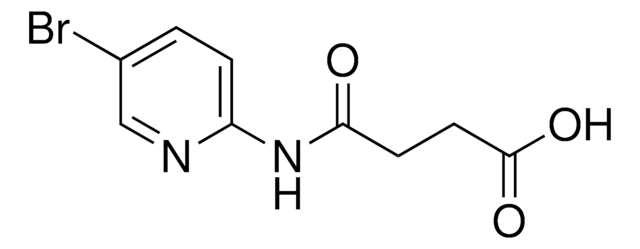B9935
BMS-345541
≥98% (HPLC), powder
Synonym(s):
N-(1,8-Dimethylimidazo[1,2-a]quinoxalin-4-yl)-1,2-ethanediamine hydrochloride
About This Item
Recommended Products
Quality Level
Assay
≥98% (HPLC)
form
powder
storage condition
desiccated
solubility
DMSO: 18 mg/mL
H2O: insoluble
originator
Bristol-Myers Squibb
storage temp.
2-8°C
SMILES string
Cl[H].Cc1ccc2nc(NCCN)c3ncc(C)n3c2c1
InChI
1S/C14H17N5.ClH/c1-9-3-4-11-12(7-9)19-10(2)8-17-14(19)13(18-11)16-6-5-15;/h3-4,7-8H,5-6,15H2,1-2H3,(H,16,18);1H
InChI key
MIDKPVLYXNLFGZ-UHFFFAOYSA-N
Application
- as an IκB kinase (IKK) complex inhibitor to study its effects on the interferon-γ (IFN-γ) production by natural killer (NK) cells
- as an IKK inhibitor to study its effects on the expression of eotaxin and monocyte chemoattractant protein-1 (MCP-1) mRNA in gingival fibroblasts
- as nuclear factor κB (NF-κB) pathway inhibitor to study its effects on tumor necrosis factor α (TNFα) production in human oral squamous carcinoma cells
Biochem/physiol Actions
Features and Benefits
Storage Class Code
11 - Combustible Solids
WGK
WGK 3
Flash Point(F)
Not applicable
Flash Point(C)
Not applicable
Personal Protective Equipment
Choose from one of the most recent versions:
Certificates of Analysis (COA)
Don't see the Right Version?
If you require a particular version, you can look up a specific certificate by the Lot or Batch number.
Already Own This Product?
Find documentation for the products that you have recently purchased in the Document Library.
Customers Also Viewed
Articles
We offer a variety of small molecule research tools, such as transcription factor modulators, inhibitors of chromatin modifying enzymes, and agonists/antagonists for target identification and validation in gene regulation research; a selection of these research tools is shown below.
We offer a variety of small molecule research tools, such as transcription factor modulators, inhibitors of chromatin modifying enzymes, and agonists/antagonists for target identification and validation in gene regulation research; a selection of these research tools is shown below.
We offer a variety of small molecule research tools, such as transcription factor modulators, inhibitors of chromatin modifying enzymes, and agonists/antagonists for target identification and validation in gene regulation research; a selection of these research tools is shown below.
We offer a variety of small molecule research tools, such as transcription factor modulators, inhibitors of chromatin modifying enzymes, and agonists/antagonists for target identification and validation in gene regulation research; a selection of these research tools is shown below.
Our team of scientists has experience in all areas of research including Life Science, Material Science, Chemical Synthesis, Chromatography, Analytical and many others.
Contact Technical Service














